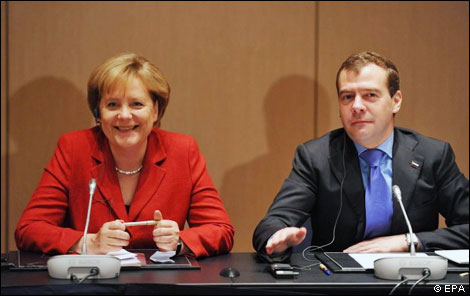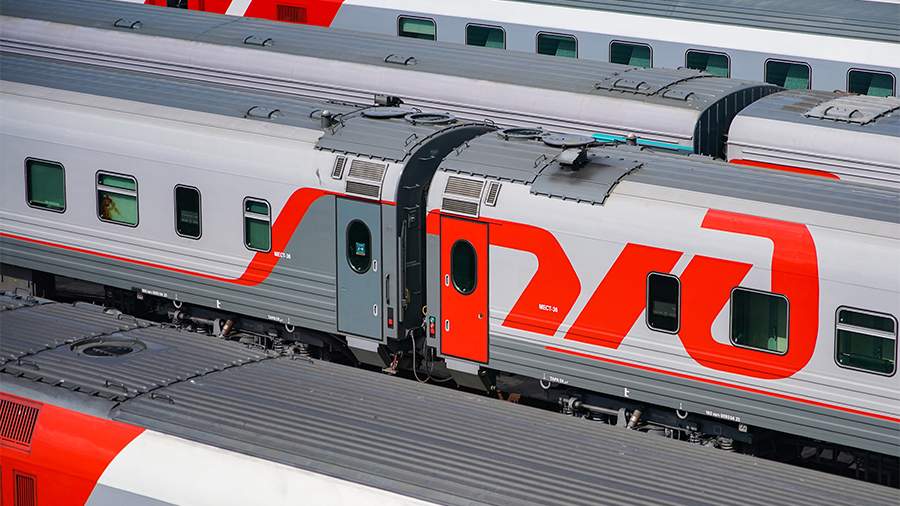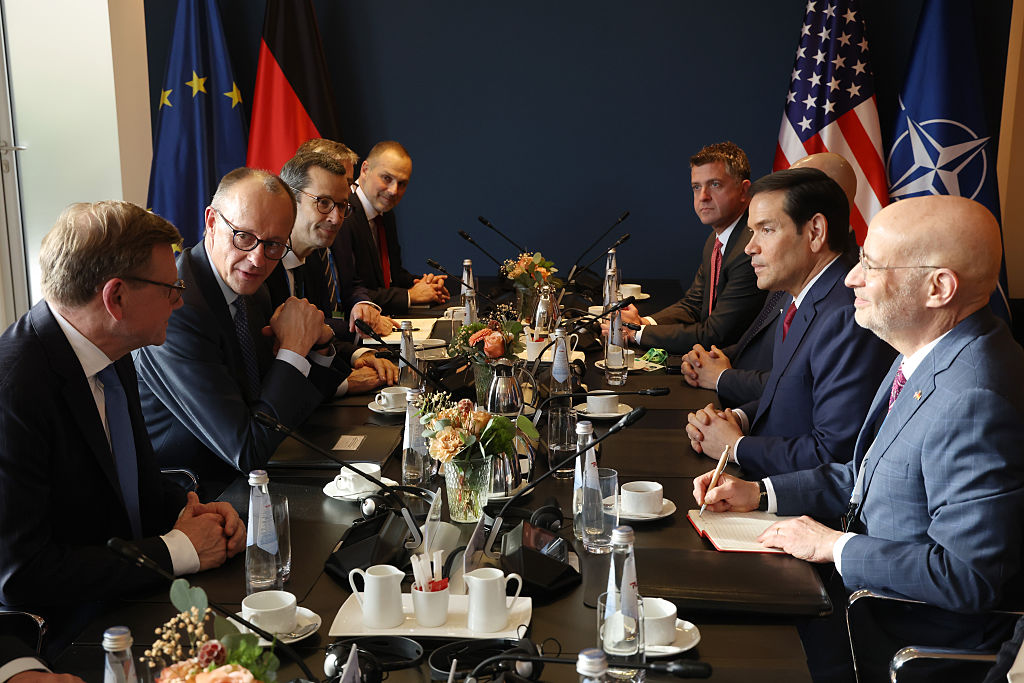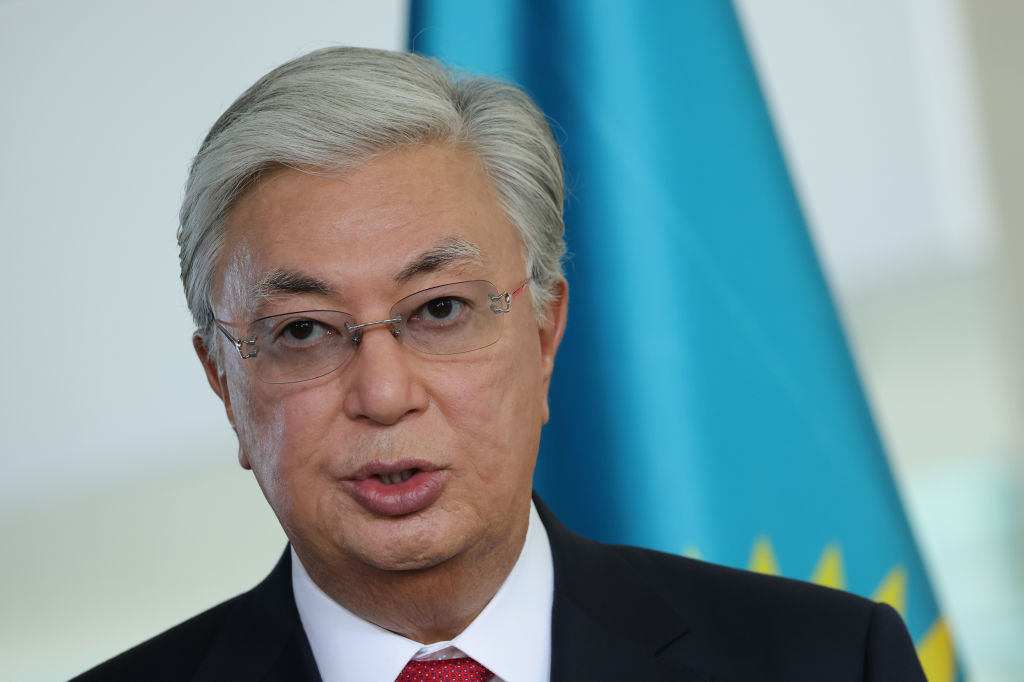
Medvedev Moots Russia-Germany “Modernization Alliance”
Medvedev Moots Russia-Germany “Modernization Alliance”
What made the annual Russian-German summit, held in Yekaterinburg last week, an event loaded with “innovative” symbolism, was President, Dmitry Medvedev’s, attempt to set Russia’s foreign policy on a new Western-friendly course. He formulated a rather untraditional set of goals at the meeting with top Russian diplomats, who were told to forget about revealing and repelling Western encroachments and to concentrate instead on “strengthening democratic and civil society institutions in Russia.” This unfamiliar task was justified as a part of a pragmatic approach aimed at contributing to Russia’s economic development by building “modernization alliances” with Germany, France, Italy, the EU and the US (Rossiyskaya Gazeta, July 13). The speech marked a new high in Medvedev spinning the liberal-modernization discourse, and his casual remark about “renouncing confrontation” was a bold departure from the geopolitical vision of Russia besieged by treacherous enemies (Kommersant, Vremya Novostei, July 13).
The rationale for this “go-West” guideline is easy to derive from the sober assessment that modernization cannot be achieved by cultivation of home-grown nano-technologies and can only happen if Microsoft and Apple, Intel and Siemens would bring their technologies and expertise to Russia. Medvedev has to convince them that he means business, but even his ambassadors remain skeptical about the content of the discourse on innovations (Ezhednevny Zhurnal, July 14). One unorthodox way to prove that the “reset” in Russian-American relations is for real was the very swift extinguishment of the potentially damaging scandal with the Russian quasi-spy network in the US (www.gazeta.ru, July 13). Medvedev reflected on that damage-minimization in a Twitter-message: “The main thing is that Russia and the US realize that sustained development, rather than weapons or spy games, underlies national security,” though his definition of “sustained development” is rather vague.
With all the publicity of tasting hamburgers with the US President, Barack Obama, it is Russian ties with Germany that really matter for Medvedev’s modernization-focused foreign policy, and this country was mentioned first in the list of potential allies exactly for this reason (Ekspert, RBC Daily, July 15). Certainly, “special relations” with Germany were cultivated during Vladimir Putin’s presidency, when the main theme was the export of natural gas and Gazprom was its key agent. Medvedev, however, is trying to re-shape relations around the agenda of investing in Russia’s industrial revival, consequently the main celebrity in Yekaterinburg was Siemens (Kommersant, July 16).
Medvedev presented the deals signed with this company as evidence of the “fundamental nature of our strategic partnership,” which he is clearly seeking to cement by deepening personal ties with Chancellor, Angela Merkel. She was ready to spend many hours in face-to-face discussions and acknowledged the good atmosphere and excellent food, but did not mention “strategic partnership.” Instead, friendly relations make it possible, according to Merkel, to discuss openly difficult matters, one of which was the complication for Russia’s entry into the World Trade Organization (WTO) stemming from the creation of the Customs Union between Russia, Belarus and Kazakhstan. Medvedev did his best to reassure her that accession to the WTO was his top priority and the possible expansion of the Customs Union to Kyrgyzstan and Tajikistan would not slow the resolution of the long-promised accession (Vedomosti, July 14).
Even more difficult for Medvedev were issues related to distortions of democracy in Russia, from which Merkel did not shy away, insisting that economic modernization and democratization of civic society could only go together. She raised specifically the question of state control over television, and Medvedev’s argument that the growth of the Internet makes this control less relevant was far from convincing, since the thriving blogosphere in Russia exists in a world of its own, while the TV remains the main political messenger. Corruption is perhaps the single most important hurdle for Western investments, and Medvedev had to admit that his high-profile efforts at curbing it had brought no tangible results (Nezavisimaya Gazeta, July 15). One particular issue touched upon by Merkel was the new legislation that expands the prerogatives of the Federal Security Service (FSB), and Medvedev insisted that he had initiated this controversial amendment (this point is omitted in the English version of the presidential website). One plausible explanation for this self-denigration is that Medvedev suspected doubts in his presidential authority and wanted to confirm that the special services were under his exclusive control (Vedomosti, July 15).
This need to demonstrate the privilege of the “decider,” betrays the ambivalence of Medvedev’s position in relation to Prime Minister, Vladimir Putin, who according to opinion polls, remains significantly more influential. In October 2009, 49 percent of respondents believed that Putin’s “personality cult’ was emerging, and currently this figure has risen to 55 percent (www.levada.ru, July 9). He refrains from undermining even implicitly Medvedev’s befriending of Merkel and Obama, but the widespread expectation concerning his return to the Kremlin in 2012 is itself a strong disincentive for relying upon the fledgling rapprochement with the West.
Building “modernization alliances” might appear to be infallibly pragmatic, but its sustainability depends directly upon the definition of “pragmatism” (www.gazeta.ru, July 15). Medvedev’s interpretation soundly puts forward economic interests, but these interests relate not to the real Russian economy, with its dilapidated infrastructure and predominant orientation of exporting raw materials, rather than an imaginary one, driven by innovations spilling over from the pilot-project in Skolkovo. This “exclusive high-tech zone” exists only in Medvedev’s imagination, and he would hardly be able to harvest any fruits from the generous financing in the short time left in his presidential countdown.
Putin’s pragmatism has a far more solid economic foundation in the inter-penetration of corrupt business and predatory bureaucracy, and its focus never waivers from the imperative of retaining political control over the feuding clans and shadow networks. Modernization has only peripheral significance in this model, and partnerships with the West could be abandoned with few doubts when domestic mobilization against external threats is found expedient for consolidating the grasp on power. This pragmatism is set to win against any drive for change, but it remains a fundamentally losing proposition because falling revenues cut the life-cycle of populist regimes shorter than the rulers expect.


